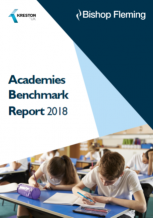With more than 200 members in our Academy team, we've got the capacity and expertise to meet your needs.
Budget 2018 – what should the Chancellor do for academies?
22nd October 2018
In the first of our thought leadership pieces ahead of the Budget on 29 October 2018, we take a look at what the Chancellor could do for Academies.
We sat down with Bishop Fleming Partner & Head of Academies, Pam Tuckett to get her thoughts on the forthcoming Budget.
Q1 – What services does Bishop Fleming provide to the education sector?
The firm is the number one provider of professional services to the academy sector, providing a full range of audit and advisory services, and we are also co-author of the annual Academies Benchmark Report.
Q2 – What are the key measures you would wish to see the Chancellor announce for the education sector, and why?
I would like to see fairer funding across all income streams for schools.
Also, whilst the fairer funding formula has promised £4,800 per secondary pupil and £3,500 per primary pupil in 2019/20, it appears this is not the full story as Local Authorities have the ability to effectively top slice the funding – referred to as a soft formula. So it is still a postcode lottery.
The only way to really do this is to give the money direct to schools and not via the Local Authority. This is what the government has proposed from 2020 – referred to as a hard formula; it would be good to see this confirmed in the Budget.
Q3 – The government is undertaking a major spending review between April and June 2019 and education will be a key focus, along with health, police etc. Are there major reforms to the way education is funded that should be considered as part of that review?
High Needs funding needs a complete overhaul as this is still not equitable. There are many schools struggling to support the most vulnerable pupils with insufficient funding. This has a major impact on small schools where just one SEND pupil can result in a huge impact on the budget for the school if the costs are not fully covered.
Q4 – In the absence of more funding, at least for the moment, what can academies do to generate more income and be more cost efficient?
The key to driving efficiencies in a Multi Academy Trust (MAT) is to centralise fully. This will include core operations such as school improvement and provision of supply staff across the Trust.
It is much harder for a single academy to find savings, as they cannot centralise and benefit from the economies of scale that being in a MAT brings.
It is very difficult for a MAT to generate more income and be creative due to the very tight regulations in the academies financial handbook. Starting a trading activity usually requires working capital and academies and their trading subsidiaries cannot borrow money, unlike the Further Education and Higher Education sectors where they can.
Q5 – How do you see the growth of MATs progressing? Is it inevitable that single academy trusts cannot afford to keep going it alone?
Probably, unless they are a big secondary. Reserves are simply being used up in many academies. The key for a single academy is to act and join a MAT before they hit a major financial problem.
Q6 – With student numbers rising, what does the government and the sector need to do to manage the increase?
This is simply down to good project management which will ensure there are enough places for pupils and enough teachers to teach them. Not hard really! Forward planning!
Q7 – Since April 2017 the IR35 legislation has forced public sector organisations that use contractors to establish if those workers are employees or self-employed. How has this affected the academy sector?
The biggest impact has been on interim CEOs, where typically in the past they would have been self-employed, but we are now seeing all of them as employed.
Trusts have taken on board the new legislation and most are pretty good at identifying a potential problem and dealing with it. Our clients have also reviewed their current sub-contractor positions and moved people onto payroll if required.
Q8 – How can evolving technology better help the sector to manage its administration and support students?
For teaching, this is an area which has been under exploited by the sector. Typically, schools use software to aid traditional teaching. Very few are exploring new techniques to support students.
Schools have used technology to administer their back-office function for many years – the driver for this is the data required by the government, e.g. census data on pupils and staff. So this is driven by the government!
The question is, can the government simplify the process just as it has done for things like renewing your car tax disc?
Q9 – What more can the government do to help prevent academies from failing?
Early intervention when the financial position is getting worse.
There is still a shortage of expertise in financial governance. But many schools can’t afford to pay for the best advice.
They are already sending SRMAs (School Resource Management Advisors) into schools that have financial difficulty, but in many cases it is still too late and financial recovery is therefore more difficult.
Early action needs to be taken, as staffing is the key cost in any academy and the lead time to make changes to the payroll costs is at least 2 terms – hence forward budgeting is essential.
The problem with forward budgeting though is that schools do not know early enough what their income will be, and increases in pension and teachers pay are announced after budgets have been approved, and far too late to make timely decisions on staffing.
Q10 – Should academy trust accounting officers receive more formal training to enhance their skills?
Absolutely. Most are head teachers with no business experience. They should acknowledge they are running a charity, which is effectively a business with charitable objects – and in this case it’s the delivery of education.
The academy sector is one of the most highly regulated sectors funded with public money due to the Academies Financial Handbook, and many accounting officers lack the skills in this area.
Watch out for the Budget on 29 October!
Bishop Fleming will be covering the Budget on the day and will follow up announcements about the education sector with Pam afterwards to see how well she thinks the Chancellor has done.





